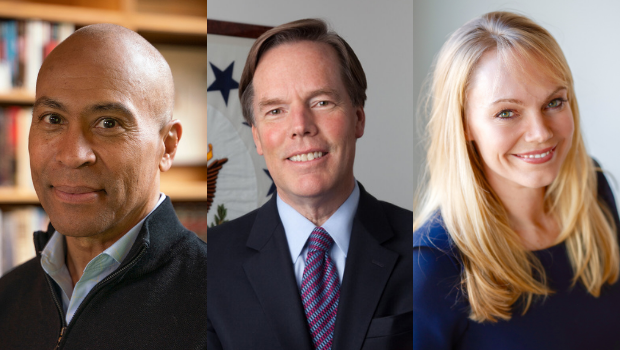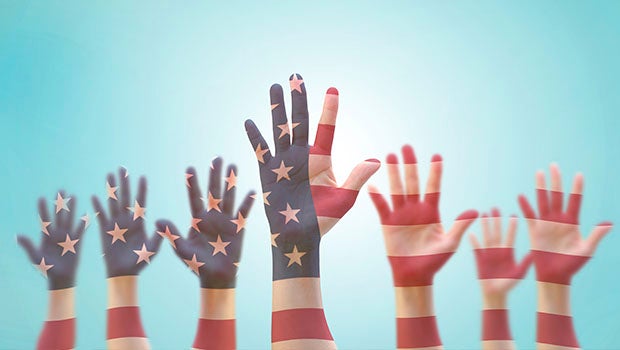Above, watch the panel discussion on why universal national service would not only enhance the lives of those serving, but would also bolster political and defense systems in the United States, featuring Ret. General Stanley McChrystal and others.
*This article originally appeared on Defense One.
Ret. General Stanley McChrystal is chair of the Franklin Project at the Aspen Institute and co-founder of McChrystal Group. He is a retired four-star general, and the former commander of US and International Security Assistance Forces Afghanistan, or ISAF, and the former commander Joint Special Operations Command, or JSOC. He is also the author of two bestselling books, “My Share of the Task” and “Team of Teams.”
Below, McChrystal explains why the defense community should support universal access to national service.
In light of the recent coordinated attacks in Paris, the bombings in Beirut and the downing of a Russian airliner, the United States and other countries are grappling with questions about the best way to strengthen our security and defeat the Islamic State, or ISIS. Despite disagreements on strategy and tactics, most agree that this is not a battle that can be won overnight or through military solutions alone. Like many global challenges we face, it will require commitment, resolve, flexibility and resilience– not just our military strength and prowess. While there is no single antidote to the myriad of challenges we face here at home and overseas, there is a single idea that we believe can contribute to bolstering our citizenry’s ability to address all of them: national service.
Right now, less than 1 percent of our population serves in the military and, in my view, we need to rethink and create a system where every young American has an opportunity to serve their nation in other ways. We need to create a culture of service where we are all invested in our nation’s future and feel a shared sense of responsibility to our nation and to each other. For this reason, I’ve joined forces with a bipartisan group of leaders on the Franklin Project Leadership Council at the Aspen Institute to focus on strengthening a commitment to service here at home beyond the realm of military service. As chair of the project, I have been committed to the mission of making a year of national service a shared experience for all young Americans. We are working to create a system of universal national service that incentivizes and encourages national service, but does not mandate it.
A system of universal national service would not only enhance the lives of the individuals serving and the communities in which they serve, but it has the potential to transform our nation by bridging divides, developing future leaders, building national resilience and fostering bipartisanship. The support of the defense and national security community is going to be critical in this effort. On Monday, I will explain more in a panel discussion co-produced with Defense One, joined by the CEO of the Center for a New American Security and former Undersecretary of Defense for Policy Michèle Flournoy and Rep. Seth Moulton, D-Mass., who served as a Marine in Iraq. Below are just four reasons I believe the community ought to be on board.
1. Bridging the military-civilian divide by building a sense of shared sacrifice: The military-civilian divide has widened with a dramatic decrease in the percentage of the population serving in the military. During World War II, more than 12 percent served compared to the less than 1 percent in our military now. In addition, almost half of those serving now live in just five states. And about 80 percent come from families with others who have served in the military. A 2012 Pew Study showed that connections between the civilian population and those serving in the military have become significantly weakened. Pew notes, “Just under four-in-ten (39%) of adults under the age of 40 say they have an immediate family member who served in the military. By contrast, 60% of veterans younger than 40 have an immediate family member who served.” In a June 2015 Sebastian Junger piece, he writes “The shocking disconnect for veterans isn’t so much that civilians don’t know what they went through—it’s unrealistic to expect anyone to fully understand another person’s experience—but that what they went through doesn’t seem relevant back home.” A system of universal national service can work to foster a shared sense of mission and understanding between those who serve in the military and those serving in other capacities overseas and at home. Universal national service would work to distribute the shared burdens associated with our foreign policy and defense decisions and commitments. Americans would feel more connected to one another, but also more connected to their country. According to Pew, 83 percent of Americans say that members of the military and their families have had to make “a lot of sacrifices,” but when asked about the general public, the number drops to just 43 percent.
2. Bolstering the talent pipeline and enhancing the defense/national security community workforce: Over the last year or so, studies have shown that Americans are becoming increasingly dissatisfied with government and trust in government is at all-time lows. Among the millennial generation, these trends are magnified with even lower social trust than prior generations. While the millennial generation is extremely interested in meaningful careers and making a difference, they do not always see government as the best way to do this. National service can help to restore greater confidence in our government by getting individuals more invested in its work. In addition, the expansion of national service programs like Peace Corps, Global Health Corps and others with a more international angle could help provide individuals with the knowledge and skills that would make them valuable assets to our defense and national security communities down the line. Programs such as these ought to be expanded not just because they work each day to assist us in facing challenges around the globe, but they train the next generation of foreign policy leaders.
3. Fostering bipartisanship: We live in an increasingly polarized country. In Washington, the ability to achieve great things and work together on issues related to national security and defense is often hampered by the gridlock of partisan politics. Bringing people from different backgrounds, geographies and political leanings together in service at a young age can teach greater empathy and understanding for those with different experiences and beliefs. Serving together whether in the military or in Teach for America or in the Peace Corps bonds individuals together on behalf of a mission and instills in them lessons that will be carried with them for the rest of their lives. Over time, these experiences can work to bring people from different communities together and hopefully drive the next generation of elected leaders to be less politically polarized than its predecessors.
4. Building national resilience and patience: Our soldiers, sailors, airmen, and Marines are accustomed to taking on important missions in support of great enterprises—tackling challenges that may ultimately take generations to solve. Unfortunately, the climate in Washington pushes for immediate solutions that favor short-term gain over the long view. When a young person undertakes a year of civilian national service, she is chipping away at a problem with no apparent end in sight: improving education, health, or the environment. Civilian national service could instill the habits of resilience and a respect for the long-term that our nation needs to make pragmatic strategic decisions.
The 2016 presidential election provides us with an opportunity to truly transform and rethink national service in America. Over the coming months, we will hear proposals and plans from candidates on a variety of issues. Despite their differences, all of them surely will be talking about different ways to make America greater, stronger and more secure. National service has traditionally been an issue embraced by presidents on both sides of the aisle. While we can’t predict what all of tomorrow’s challenges will look like, a nation in which we are all committed to serving is bound to be stronger and more united than one that is not.

